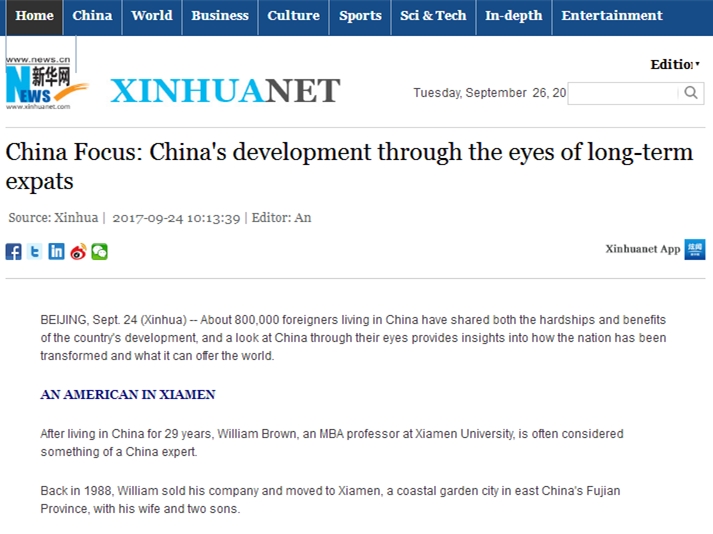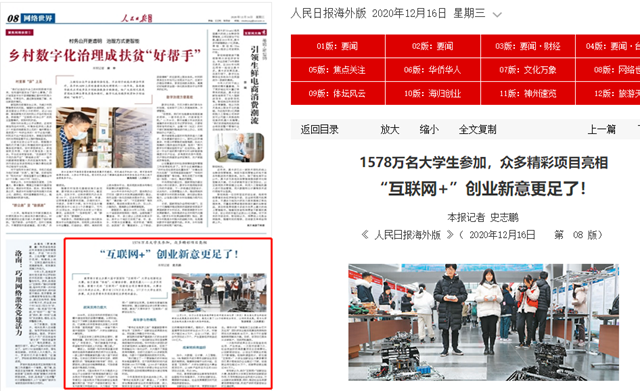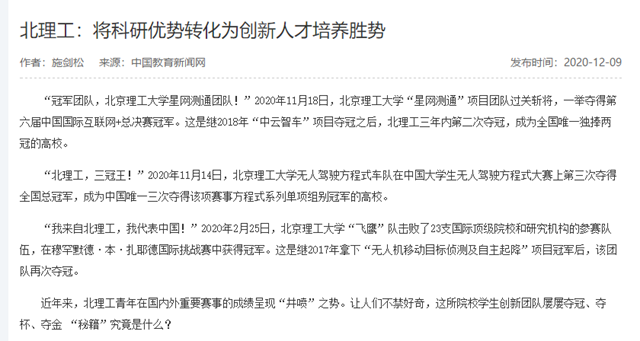【新華網(wǎng)】中國(guó)焦點(diǎn):長(zhǎng)期定居中國(guó)的外國(guó)友人看中國(guó)的發(fā)展
發(fā)布日期:2017-09-26 供稿:新華網(wǎng) 編輯:薛喬丹 審核:王征 閱讀次數(shù):
原文標(biāo)題:China Focus: China's development through the eyes of long-term expats
中國(guó)焦點(diǎn):長(zhǎng)期定居中國(guó)的外國(guó)友人看中國(guó)的發(fā)展
原文鏈接:http://news.xinhuanet.com/english/2017-09/24/c_136633519.htm

BEIJING, Sept. 24 (Xinhua) -- About 800,000 foreigners living in China have shared both the hardships and benefits of the country's development, and a look at China through their eyes provides insights into how the nation has been transformed and what it can offer the world.
?。ㄐ氯A社北京9月24日電)在中國(guó),,80萬余外國(guó)人共同見證了中國(guó)發(fā)展經(jīng)歷的一系列困難以及克服困難后所獲得的利益。通過他們的視角來看中國(guó),你完全可以了解到中國(guó)做了怎樣的轉(zhuǎn)型,,并為世界帶來了什么。
AN AMERICAN IN XIAMEN
廈門的美國(guó)人——威廉?布朗
After living in China for 29 years, William Brown, an MBA professor at Xiamen University, is often considered something of a China expert.
在中國(guó)生活了29年的廈門大學(xué)MBA教授威廉?布朗,,經(jīng)常被叫做中國(guó)“百事通”,。
Back in 1988, William sold his company and moved to Xiamen, a coastal garden city in east China's Fujian Province, with his wife and two sons.
早在一九八八年,威廉賣了他的公司,,帶著他的妻兒一同搬到了這個(gè)位于福建省東部的沿?;▓@城——廈門。
"I chose Xiamen University because it was the only university that allowed foreigners to take their families with them to learn Chinese at that time," said the former U.S. military man, once stationed in Taiwan.
談到當(dāng)初如何做的決定,,這位曾一度駐扎在臺(tái)灣的美國(guó)前軍事人員解釋說:“我當(dāng)初選擇了廈門大學(xué),,因?yàn)檫@是唯一一所大學(xué)允許外國(guó)人及其家人一同學(xué)習(xí)中文?!?/p>
The Brown family flew from California to Hong Kong, where they took a miserable 18-hour boat ride to reach the coastal city.
布朗一家四口當(dāng)初先從加利福尼亞州飛往香港,,然后又度過了18小時(shí)船程,才輾轉(zhuǎn)到達(dá)了這座沿海城市,。
Back then, there were only three bus routes in the whole city.
當(dāng)時(shí),,全廈門市也就只有三條公交路線。
"The floor of the buses were made of wood, and the bus exhaust fumes could come into the bus," he said.
“當(dāng)時(shí),,公共汽車的地面是用木頭做的,,汽車尾氣也可以進(jìn)入車?yán)铩?/p>
Brown said he has witnessed China changing from being "really backward" to moderately prosperous over 30 years.
布朗還說,他在這近30年間見證了中國(guó)從“相當(dāng)落后”到現(xiàn)在的繁榮發(fā)展,。
In addition to teaching, he has been committed to developing English websites and has published more than 10 English books about Xiamen.
除了教學(xué)外,,布朗也一直致力于開發(fā)英語網(wǎng)站,并且他發(fā)表了十多本關(guān)于廈門的英文書籍,。
Brown said he was excited when he once walked into a bookstore and found that several young students were reading his books with a dictionary in their hands.
布朗說,,他曾經(jīng)走進(jìn)一家書店并很興奮地發(fā)現(xiàn),發(fā)現(xiàn)有幾個(gè)年輕的學(xué)生一邊閱讀他的書籍,,一邊用手中的字典查閱不懂的詞匯,。
"The young people love their city and want to know a foreigner's perspective on it," he said.
他說:“那些年輕人熱愛自己的城市,,同時(shí),他們也想獲知外國(guó)人對(duì)這座城市的評(píng)價(jià)與理解,?!?/p>
This inspired him to publish the Chinese edition of the book "Discover Gulangyu." This small island in Xiamen entered the UNESCO world heritage list in July this year for its cultural history and historic buildings.
這極大地鼓舞了布朗出版他的中文書《發(fā)現(xiàn)鼓浪嶼》。也就在今年七月,,鼓浪嶼——這個(gè)廈門小島,,因其文化歷史和歷史建筑被選入聯(lián)合國(guó)教科文組織世界遺產(chǎn)名錄。
Brown said he was more than happy that a traditional Chinese version would be published in Taiwan later this year.
布朗說,,沒有什么比今年晚些時(shí)候他的中文書籍可以在臺(tái)灣發(fā)售更開心的事了,。
"Only when the youth understand history can they walk into the future," he said.
“只有青年人了解了歷史,他們才能更好地走向未來,?!?/p>
He was excited when the city of Xiamen hosted the BRICS summit from Sept. 3 to 5.
9月3至5日,廈門主辦的金磚國(guó)家峰會(huì)同樣令他興奮不已,。
"The G7 and G20 are the past, while BRICS is the future," he said. "BRICS offers opportunities for countries to find a way to do business."
“G7峰會(huì)和G20峰會(huì)都已是過去時(shí),,而金磚國(guó)家峰會(huì)指引著未來”,“這將為各國(guó)提供發(fā)展商業(yè)的機(jī)會(huì),,”他說,。
He said it is right that China has put forward the concept of "BRICS Plus" by inviting Egypt, Mexico, Thailand, Tajikistan and Guinea for dialogue.
中國(guó)提出邀請(qǐng)埃及、墨西哥,、泰國(guó),、塔吉克斯坦與幾內(nèi)亞加入“金磚四國(guó)+”的強(qiáng)強(qiáng)對(duì)話是十分明智的。
A KOREAN IN HEFEI
合肥的韓國(guó)人——喬松惠
Korean teacher Cho Sung Hye landed in Hefei, capital of east China's Anhui Province, in 1996, and had no idea she would stay for so long. In 2006, she became the first person from the Republic of Korea (ROK) to get China's "green card" for permanent residence.
韓國(guó)籍老教師喬松惠于1996年來到合肥——安徽省省會(huì),。那時(shí),,她不知道自己會(huì)待在中國(guó)這么長(zhǎng)時(shí)間。2006年,,她成為第一個(gè)獲得中國(guó)“綠卡”的韓國(guó)人,,享有永久居留權(quán)。
"None of my friends back home knew where Hefei is in China, and there was not a single foreigner that I could find in the city," Cho said, in fluent Chinese.
喬老師用一口流利的中文說道:我在韓國(guó)的朋友沒有一個(gè)人知道合肥在中國(guó)的具體位置,。當(dāng)時(shí),,我在這座城市里遇不到一個(gè)外國(guó)人?!?/p>
She remembered that 1996 was just four years after the late Chinese leader Deng Xiaoping made a series of landmark speeches marking China's opening up and modernization.
There were only eight students in her Korean language class, which used the smallest classroom in Hefei College. Now the school has four Korean major classes, enrolling 500 students a year.
Over the past 20 years, Cho has seen 3,500 of her students go to the ROK for further studies.
她回憶道,在1996年,,也就是在已故中國(guó)領(lǐng)導(dǎo)人鄧小平提出了一系列具有里程碑意義的講話標(biāo)志著中國(guó)的改革開放和現(xiàn)代化建設(shè)的四年后,,她在合肥大學(xué)最小的教室里講授韓語課,而當(dāng)時(shí)班級(jí)里只有8名學(xué)生,。而現(xiàn)在學(xué)校有四個(gè)韓國(guó)專業(yè)班,,每年招收500名學(xué)生,。過去的20年里,喬老師有3,500名學(xué)生去韓國(guó)深造自己的學(xué)業(yè),。
"When I got here, I could not even find a Korean language dictionary. I asked my brother to mail me a dozen dictionaries and asked the consulate people from Shanghai for help to print teaching materials for my Chinese students," Cho said.
喬老師說:“當(dāng)我剛來到這里的時(shí)候,,我甚至找不到一本韓語字典。我還是叫我哥哥給我寄的一本字典,,并請(qǐng)上海領(lǐng)事館的人幫我的中國(guó)學(xué)生打印教材,。”
She said it was the students' thirst and passion for learning a foreign language and new knowledge that inspired her.
正是學(xué)生們對(duì)學(xué)習(xí)外國(guó)語言以及新知識(shí)的渴求鼓舞了她,。
"Even at that time, I could feel China's shining vigor and that it was on the way to rejuvenation into a great international power, and the world needed to establish closer ties with China," she said.
“即使是在那個(gè)時(shí)候,,我也能感覺到中國(guó)重新煥發(fā)的活力,也能體會(huì)得到中國(guó)正走在成為國(guó)際大國(guó)的復(fù)興之路上,與世界需要建立更緊密的關(guān)系,?!?/p>
Cho is now more than a teacher. She still routinely has 10 classes a week at school, but in 2016 the 57-year-old woman started a cultural exchange business, which recruits international talent to Anhui.
她現(xiàn)在不僅僅是一名老師了。雖然,,她仍每周在學(xué)校有10節(jié)課,,但在2016歲,這位57歲的婦女開始了一項(xiàng)文化交流業(yè)務(wù)——將國(guó)際人才招募到安徽,。
"China's wheel of development won't stop rolling. Too many foreign people that I know are eager to study, work and live here. I am so lucky that I've made it my home," she said.
“中國(guó)的發(fā)展不會(huì)停步,。我認(rèn)識(shí)的很多外國(guó)人,都渴望在這里學(xué)習(xí),、工作和生活,。我真的十分幸運(yùn),在中國(guó),,我有了我的家,,”她說。
Cho said she no longer suffered from homesickness as it takes less than three hours to fly from Hefei to Incheon Airport in Seoul.
喬老師也不再那么想家了,,因?yàn)檠杆俚陌l(fā)展,,從合肥飛往漢城仁川機(jī)場(chǎng)用時(shí)不到三個(gè)小時(shí)。
A JAPANESE IN BEIJING
北京的日本人——福田敏男
Toshio Fukuda, a Japanese nano-tech scientist, made his first visit to Beijing in 1995, attending a manufacturing technology summit at the invitation of China's Ministry of Science and Technology.
應(yīng)中國(guó)科技部的邀請(qǐng),,日本納米技術(shù)科學(xué)家福田敏男于1995年第一次訪問北京,,并出席了制造技術(shù)峰會(huì)。
Since then, his communication with China has continued. He has been teaching as a visiting professor in a number of China's high-tech institutions, including Harbin Institute of Technology, Chinese Academy of Sciences and Huazhong University of Science and Technology. From 2000, he decided to completely base his research work at Beijing Institute of Technology (BIT) and has stayed ever since.
此后,,他與中國(guó)的溝通一直繼續(xù),。曾任哈爾濱工業(yè)大學(xué),中國(guó)科學(xué)院,,華中科技大學(xué)等多家中國(guó)科研院所客座教授,。從2000年起,他決定將他的研究工作完全在北京理工大學(xué)(BIT)完成,,并且直到如今,,也在北理工繼續(xù)他的研究,。
"As a scientist, I want the micro-nano field to grow bigger and deeper, no matter where my research is based," he said.
“作為一名科學(xué)家,無論我在哪里進(jìn)行研究,,我只希望微納米領(lǐng)域的發(fā)展越來越好,,”他說。
He led the innovation in developing micro-nano robots as small as a particle of dust in the air, and artificial blood vessels as thin as a capillary.
他領(lǐng)導(dǎo)了這項(xiàng)創(chuàng)新,,研制出微型納米機(jī)器人,,其體積小如空氣中的塵埃顆粒,人造血管細(xì)如毛細(xì)血管,。
He said that Chinese people worked very hard. When he first came to China, the only computer integrated manufacturing was in a lab of Tsinghua University.
他說中國(guó)人民工作很努力,。當(dāng)他第一次來到中國(guó),唯一的計(jì)算機(jī)集成制造是在清華大學(xué)的實(shí)驗(yàn)室里,。
"The Chinese government did not have a lot of funding, but it funded Tsinghua's research," he said.
他說:“當(dāng)時(shí),,中國(guó)政府并沒有很多資金,但是卻選擇資助了清華的研究,?!?/span>
By 2000, he could see research on robotic technology was spreading to science institutes all over China.
到2000年,他可以看到機(jī)器人技術(shù)的研究正在向全國(guó)各地的科學(xué)研究機(jī)構(gòu)傳播,。
Fukuda said he chose BIT as his base because of the research environment, and because the National Science Foundation provided funding for his research.
福田教授解釋說他之所以選擇北京理工大學(xué)作為他的基地,,是因?yàn)槠淞己玫难芯凯h(huán)境,并且由于國(guó)家科學(xué)基金會(huì)也為他的研究提供資金資助,。
"The school has a very nice human relationship and facility, and the Chinese I know work harder than the Japanese," he said.
他說:“學(xué)校有著非常好的人際關(guān)系和完備的設(shè)施,。中國(guó)人也比日本人更加努力,”
China is his home now, and many people tell him that he is already half-Chinese. Indeed, his favorite food is hot-pot, a spicy Sichuan-style food, and his youngest daughter also speaks Chinese.
中國(guó)現(xiàn)在是他的家,,很多人評(píng)價(jià)他已經(jīng)是半個(gè)中國(guó)人了,。事實(shí)上,他最喜歡的食物是四川火鍋,,他的小女兒也會(huì)講中文,。
"In 2025, micro-nano robotics will be very important for China to realize its modern industrial manufacturing goals. How can we make it different from countries? Better performance, higher efficiency and lower cost. That's what micro-nano robotics are going to do," Fukuda said.
“2025年,微納機(jī)器人將對(duì)中國(guó)實(shí)現(xiàn)其現(xiàn)代工業(yè)制造目標(biāo)非常重要,,我們?nèi)绾问共拍芘c國(guó)家不同,?應(yīng)該就是更好的性能,更高的效率和更低的成本吧,,這就是微納機(jī)器人將要做的,,”福田教授說。
分享到:

